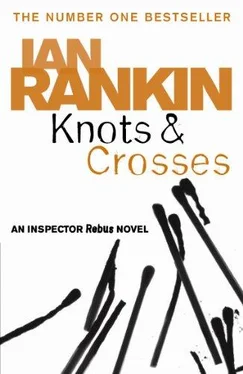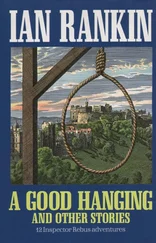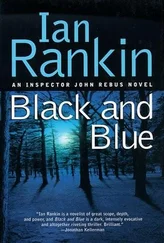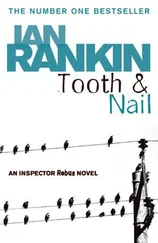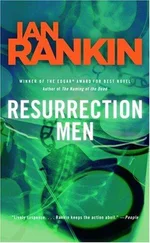‘Then you’re cleverer than I took you for,’ she said.
‘You’d be surprised.’
He was growing tired, realising that the game was going nowhere. It was all midfield, a friendly rather than a cup-tie. He checked his watch conspicuously.
‘Time I was getting back,’ he said.
She picked up her newspaper.
‘Are you doing anything this weekend?’ she asked.
John Rebus sat down again.
He left the station at four o’clock. The birds were doing their best to persuade everyone that it was dawn, but no one seemed fooled. It was dark still, and the air was chilled.
He decided to leave his car and walk home, a distance of two miles. He needed it, needed to feel the cool, damp air, the expectancy of a morning shower. He breathed deep, trying to relax, to forget, but his mind was too full of those files, and little pieces of recollected fact and figure, pieces of horror no bigger than a paragraph, haunted his walk.
To indecently assault an eight-week old baby girl. The babysitter who had calmly admitted to the assault saying that she had done it ‘for a kick’.
To rape a grandmother in front of her two grandchildren, then give the kids some sweets from a jar before leaving. The act premeditated; committed by a bachelor of fifty.
To burn with cigarettes the name of a street gang onto the breasts of a twelve-year old, leaving her for dead in a burning hut. Never caught.
And now the crux: to abduct two girls and then strangle them without having sexually abused them. That, Anderson had posited only thirty minutes before, was a perversion in itself, and in a funny way Rebus knew what he meant. It made the deaths even more arbitrary, more pointless — and more shocking.
Well, at least they were not dealing with a sex-offender; not right away. Which only, Rebus was forced to agree, made their task that much more difficult, for now they were confronted with something like a ‘serial killer’, striking at random and without clues, aiming at the record books rather than at any idea of ‘kicks’. The question now was would he stop at two? It seemed unlikely.
Strangulation. It was a fearful way to go, wrestling, kicking your way towards oblivion, panic, the fretful sucking for air, and the killer behind you most likely, so that you faced the fear of something totally anonymous, a death without knowledge of who or why. Rebus had been taught methods of killing in the SAS. He knew what it felt like to have the garotte tighten on your neck, trusting to the opponent’s prevailing sanity. A fearful way to go.
Edinburgh slept on, as it had slept on for hundreds of years. There were ghosts in the cobbled alleys and on the twisting stairways of the Old Town tenements, but they were Enlightenment ghosts, articulate and deferential. They were not about to leap from the darkness with a length of twine ready in their hands. Rebus paused and looked around him. Besides, it was morning now and any godfearing spirit would be tucked up in bed, as he, John Rebus, flesh and blood, would be soon.
Near his flat, he passed a little grocery shop outside which were stacked crates of milk and morning rolls. The owner had complained in private to Rebus about petty and occasional thefts, but would not submit a complaint proper. The shop was as dead as the street, the solitude of the moment disturbed only by the distant rumble of a taxi on cobblestones and the persistence of the dawn chorus. Rebus looked around him, examining the many curtained windows. Then, swiftly, he tore six rolls from a layer and stuffed them into his pockets, walking away a little too briskly. A moment later he hesitated, then walked on tiptoe back to the shop, the criminal returning to the scene of the crime, the dog to its vomit. Rebus had never actually seen dogs doing that, but he had it on the authority of Saint Peter.
Looking round again, he lifted a pint of milk out of its crate and made his getaway, whistling silently to himself.
Nothing in the world tasted as good for breakfast as stolen rolls with some butter and jam and a mug of milky coffee. Nothing tasted better than a venial sin.
He sniffed the stairwell of his tenement, catching the faint odour of tom-cats, a persistent menace. He held his breath as he climbed the two flights of stairs, fumbling in his pocket beneath the squashed rolls, trying to liberate his door-key.
The interior of the flat felt damp and smelt damp. He checked the central heating and, sure enough, the pilot-light had gone out again. He cursed as he relit it, turning the heat up all the way, and went through to the living-room.
There were still spaces on the book-case, the wall-unit, the mantelpiece where Rhona’s ornaments had once stood, but many of the gaps had already been filled by new mementoes of his own: bills, unanswered letters, old ring-pulls from tins of cheap beer, the occasional unread book. Rebus collected unread books. Once upon a time, he had actually read the books that he bought, but these days he seemed to have so little time. Also, he was more discriminating now than he had been then, back in the old days when he would read a book to its bitter end whether he liked it or not. These days, a book he disliked was unlikely to last ten pages of his concentration.
These were the books that lay around his living-room. His books for reading tended to congregate in the bedroom, lying in co-ordinated rows on the floor like patients in a doctor’s waiting-room. One of these days he would take a holiday, would rent a cottage in the Highlands or on the Fife coast, and would take with him all of these waiting-to-be-read-or-reread books, all of that knowledge that could be his for the breaking open of a cover. His favourite book, a book he turned to at least once a year, was Crime and Punishment. If only, he thought, modern murderers would exhibit some show of conscience more often. But no, modern killers bragged of their crimes to their friends, then played pool in their local pub, chalking their cues with poise and certainty, knowing which balls would drop in which order …
While a police-car slept nearby, its occupants unable to do anything save curse the mountains of rules and regulations and rue the deep chasms of crime. It was everywhere, crime. It was the life-force and the blood and the balls of life: to cheat, to edge; to take that body-swerve at authority, to kill. The higher up you climbed into crime, the more subtly you began to move back towards legitimacy, until a handful of lawyers only could crack open your system, and they were always affordable, always on hand to be bribed. Dostoevsky had known all that, clever old bastard. He had felt the stick burning from both ends.
But poor old Dostoevsky was dead and had not been invited to a party this weekend, while he, John Rebus, had. Often he declined invitations, because to accept meant that he had to dust off his brogues, iron a shirt, brush down his best suit, take a bath, and splash on some cologne. He had also to be affable, to drink and be merry, to talk to strangers with whom he had no inclination to talk and with whom he was not being paid to talk. In other words, he resented having to play the part of a normal human animal. But he had accepted the invitation given to him by Cathy Jackson in the Waverley Road canteen. Of course he had.
And he whistled at the thought of it, wandering through to the kitchen to make some breakfast, which he then took through to his bedroom. This was a ritual after a night duty. He stripped, climbed into bed, balanced the plate of rolls on his chest, and held a book to his nose. It was not a very good book. It was about a kidnapping. Rhona had taken away the bed proper, but had left him the mattress, so it was easy for him to reach down for his mug of coffee, easy for him to discard one book and find another.
Читать дальше
